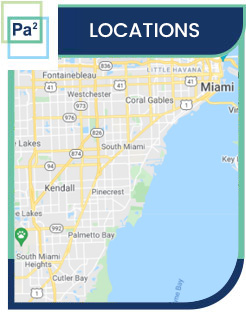Asthma: Diagnosis, Causes, Treatment and Management in Coral Gables and Palmetto Bay, FL
Asthma is a chronic inflammation of the lung airways that causes coughing, chest tightness, wheezing, or shortness of breath. 8.3% of Americans have asthma. Of these 26.5 million, 20.4 million are adults and 6.1 million are children. Learn the causes, diagnosis, management, and treatment options available at Piniella Asthma + Allergy. For more information, contact us or schedule an appointment online. We have convenient locations to serve you in Coral Gables, FL and Palmetto Bay, FL!


Table of Contents:
Do you have asthma?
What causes asthma symptoms?
Asthma Symptoms
Asthma Triggers
Asthma Management and Treatment
Asthma Facts and Figures
Asthma is medically defined as airway obstruction that can be reversed with medications. What symptoms do patients suffer from? Most people associate asthma with wheezing, severe shortness of breath, and the constant utilization of inhalers. The vast majority of patients never suffer from severe asthma on a constant basis but may have periodic attacks. Asthma symptoms may consist of cough when exercising, when laughing or when exposed to certain substances, shortness of breath, wheezing, inability to catch a full breath, or becoming winded easily. Symptoms can range from extremely mild to life-threatening.
• The number of people with asthma continues to increase with about 1 out of every 12 persons in the United States suffering from asthma, or about 25-30,000,000 people.
• Asthma affects children more commonly than adults, but asthma is found in all age groups.
• Asthma is very often misdiagnosed and treated as upper respiratory tract infections or recurrent “colds”.
Airway inflammation is the common factor that affects all asthmatics. This inflammation whether it be caused by exposure to substances that cause allergies or substances that cause irritation produces swelling of the airways and mucus.
Diagnosing asthma and its severity is extremely important. Treatment depends on multiple factors but can range from avoidance of those substances that cause symptoms, rescue bronchodilators such as albuterol, inhaled steroids, leukotriene inhibitors, oral steroids, or monoclonal antibodies, and the usage of allergy shots or immunotherapy to recalibrate immune system and prevent inflammation.
One of the main causes of asthma is exposure to substances that cause allergies. These include indoor and outdoor substances including dust mites, cats, insects, pollens, molds, and foods. Asthma can also be caused by exposure to chemicals or other substances that cause irritation of the airways as well as infections, strong smells, or exercise.
Diagnosing asthma may be difficult at times. Your Asthma and Allergy specialist will take a detailed l exam, perform a physical examination and use additional tools to make this diagnosis. Pulmonary Function Testing and allergy testing are the major tools used to assess and diagnose asthma.
Source: American College of Allergy, Asthma, and Immunology
If you frequently experience shortness of breath or you hear a whistling or wheezy sound in your chest when you breathe, you may have asthma — a chronic condition that causes inflammation and narrowing of the bronchial tubes, the passageways that allow air to enter and leave the lungs. If people with asthma are exposed to a substance to which they are sensitive or a situation that changes their regular breathing patterns, the symptoms can become more severe.
Asthma symptoms affect an estimated 26 million Americans — 19 million adults and 7 million children — and are one of the leading causes of absences from work and school. Asthma often runs in families; according to the World Health Organization, about half the cases are due to genetic susceptibility, and half result from environmental factors. Although there is no cure for asthma, effective treatments are available. Asthma can be best managed by seeing an allergist.
There are two types of asthma: allergic (caused by exposure to an allergen) and nonallergic (caused by stress, exercise, illnesses like a cold or the flu, or exposure to extreme weather, irritants in the air, or some medications).
• Coughing
• Shortness of breath
• Chest tightness
• Wheezing (a whistling or squeaky sound in your chest when you breathe, especially when exhaling)
For more detailed information, visit the asthma symptoms page.
• Outdoor allergens, such as pollens from grass, trees, and weeds
• Indoor allergens, such as pet dander, dust mites, and mold
• Certain drugs and food additives
• Irritants in the air, such as smoke, chemical fumes, and strong odors
• Colds, the flu, or other illnesses
• Exercise (although people with asthma can benefit from some exercise)
• Stress
• Weather conditions, such as cold air or extremely dry, wet, or windy weather
Prevention of symptoms is the best strategy. A person with asthma should know what situations trigger an attack and avoid them whenever possible. If asthma attacks are severe, unpredictable or flare up more than twice a week, consultation with an allergist can help to determine their cause and provide long-term treatment that controls or eliminates the symptoms.
For more detailed information, visit the asthma treatment page.
Studies show that people with asthma who see a specialist, such as an allergist, reduce their:
• Symptoms
• Emergency room visits
• Hospital stays
• Visits to the doctor because they are sick
• Missed days from work or school
• Healthcare costs
If asthma is left unmanaged or is misdiagnosed, it can be deadly:
• Asthma is among the most common chronic childhood illnesses, accounting for 10.5 million missed school days a year. It also accounts for 14.2 million lost workdays for adults.
• Every year, about 14 million Americans see a doctor for asthma. About 1.4 million patients visit a hospital outpatient department for asthma; almost 1.75 million go to a hospital emergency room.
• The number of people in the U.S. diagnosed with asthma is increasing. The greatest rise in asthma rates is among black children, with an almost 50 percent increase from 2001 through 2009.
• Researchers estimate asthma-related costs, including the direct cost of health care and indirect costs such as decreased worker productivity, at around $60 billion annually.
Many people with asthma manage the condition well and can live a healthy and productive life by avoiding triggers and following their allergists’ instructions. If left unmanaged or misdiagnosed, asthma can be fatal; about 3,300 people die from it annually.
Call us for more information. We serve patients from Coral Gables FL, Palmetto Bay FL, Westchester FL, Brownsville FL, Kendall FL, Pinecrest FL, Richmond West FL, and Goulds FL.

Additional Services You May Need
▸ Asthma
▸ Allergy Testing
▸ Food Allergies
▸ Immunotherapy
▸ Patch Testing
▸ Allergy Treatment
▸ Pediatric Asthma Specialist
▸ Pediatric Allergist
▸ Insect Bite Allergy
▸ Drug Allergy
▸ Seasonal Allergies
▸ Skin Allergy

Additional Services You May Need
▸ Asthma
▸ Allergy Testing
▸ Food Allergies
▸ Immunotherapy
▸ Patch Testing
▸ Allergy Treatment
▸ Pediatric Asthma Specialist
▸ Pediatric Allergist
▸ Insect Bite Allergy
▸ Drug Allergy
▸ Seasonal Allergies
▸ Skin Allergy


